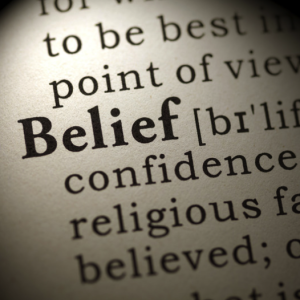I’ve Heard it Said…
… that a good argument against theism is that the default for humanity is atheism. The argument goes like this:
- If the default position for humanity is atheism then theism cannot be true.
- The default position for humanity is atheism.
- Therefore, theism cannot be true.
Said in simpler terms, one only believes in God because they were told to. We were indoctrinated to believe in God by our parents who were indoctrinated by their parents, and so on. We were sat in front of preachers who pummeled the pulpits and we were forced to watch Veggie Tales (The Horror). These teachers threaten us with fire and brimstone, and thus they abuse us into belief. Because of these things, we, as Christians, have been brainwashed into believing that God exists, that hell is real, that Jesus is more than a myth, and that we can have a relationship with this God.
It’s impossible to think that human beings can logically come to conclusion that God is real by themselves… so the argument goes (I’ve pieced different parts together that I’ve heard in various formats.)
Whatever are we to do?
In order to dispose of this argument, we need to deal with the premises.
Premise 1: If the default position for humanity is atheism then theism cannot be true.
Have you ever heard someone say something like this? In order to discard the belief in God as nothing more than believing in the tooth fairy or Santa Claus, someone will bring this to you with the ultimate feeling of triumph. Yet, this statement makes a couple of crucial mistakes.
The first mistake has to do with the nature of truth.
Truth itself refers to whatever aligns with reality. For instance, if I say: “My wife is sleeping on the couch.” This statement is only true if my wife is, in fact, sleeping on the couch.
If I say: “My van only has a quarter of a tank of gas left,” the only way for this to be true is if my van, does in fact, have only a quarter of a tank of gas left to go.
If I may the statement: “I am a man,” the only way that this is true is if, in reality, I am a man.
In other words truth exists outside of my beliefs. It is not based on my beliefs. I can believe something to be true that does not match up with reality. I can believe that the George Washington is the 10th president of the United States, yet that doesn’t make it true.
I can believe that a square circle exists.
I can believe that the world was flat.
Even if atheism is the default position of humanity, that doesn’t make it true.
The second mistake has to do with claim itself.
First, I am more than happy to concede that human beings start off as a clean slate. Maybe this is true, or maybe not.
Yet, the default is not necessarily atheism. It’s a position of learning. Human beings are born learners.
We are not default walkers, speakers or eaters of solid food. We are not born knowing how to write, or knowing how to perform surgery. In other words, human beings learn everything from somewhere. This includes non-belief: atheism.
Second this claim seems to commit the genetic fallacy. The genetic fallacy does not deal with the claims “God Exists” or “Theism is True.” Rather, the claim points to the origin of the belief and then declares the belief to be false instead of examining the evidence for the belief itself. It’s similar to when someone says: “You are only a Christian because you grew up in a Christian household.”
I could easily say: “You are not a Christian because you grew up in a non-Christian household.” If I were to make this claim, one would quickly point out that I’m not givng a case for theism, or giving a case against a non-Christian stance. Rather, I would simply disgard the non-Christian claim because of it’s origin.
The truth of the claim is separate from the origin, and thus the origin of belief of the existence of a deity of any sort does not matter. The belief itself does.
The default for humanity, at the end of the day, is not a tell for whether a belief is true or not.
Premise 2: The default position for humanity is atheism
Premise 2 relies on premise 1. It is merely a bridge to get to the conclusion.
Therefore, not much needs to be said here.
However, I propose that just as we have all learned how to walk, talk, and speak. And just has all humans on the planet have learned how about nature, what not to do and what to do, as well doing everyday chores like laundry or filling a water jug, we also learn what to believe (and hopefully why) from those that came before. This goes for those who believe that God does, in fact, exists, and those that don’t. The atheist is in no position to claim that their position is the default of humans. Atheism is just as possible at being true as theism.
Plausibility
So, if the default for humanity not belief nor unbelief, and truth exists outside of our own mental assent, are their good reasons to believe that the Christian Worldview is true? The answer to this question is out of the scope of this article.
However, there are a few observations that we can make now.
I think that out of nothing, nothing comes, and that since there is a beginning to the universe then there needs to be an intelligent mind to get it started.
I think that the order that we see in the cosmos, a topic that we will look at in future articles, points to a designer.
Morality cannot be grounded in subjective choice adequately, whether it be by individuals or societies, and must be grounded in a standard outside of oursleves. The phrase: “Murder and Genocide are wrong,” can only be true for everyone on the planet if there is a standard outside of one’s mind or cultural.
The evidence for the resurrection of Jesus of Nazareth at least gives a plausibilty to a metaphysical reality and would point to Christian Theism being true.
At the end of the day, the question of the default belief set of human beings means nothing. The plausibility of atheism or theism, Christianity or Islam, Bhuddism or Hinduism, rests on the evidence for each.
Personally, I think Christian Theism has the best supporting evidence. We’ll look at some of this evidence in due time.
What do you think: Is the default position for humanity theism, atheism, or a position of learning? Leave a Comment Below!
If you wish to continue to follow our content…
Make sure to subscribe to our Newsletter!
You can follow us on Facebook by clicking Here
Find us on X @TheistThinking
You can follow us on Instagram at the_thinking_theist
You can find the rest of our articles HERE


















